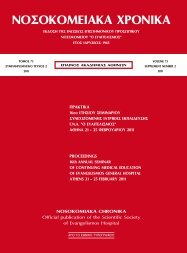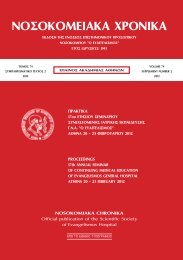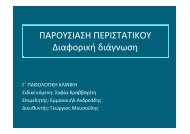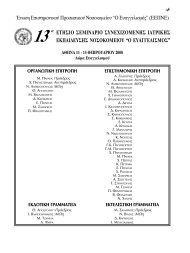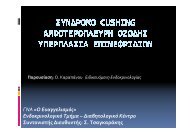åêðáéäåõóçó γ.ν.α.
åêðáéäåõóçó γ.ν.α.
åêðáéäåõóçó γ.ν.α.
You also want an ePaper? Increase the reach of your titles
YUMPU automatically turns print PDFs into web optimized ePapers that Google loves.
371<br />
Οξύ αγγειακό εγκεφαλικό επεισόδιο<br />
Α Ταβερναράκης<br />
SUMMARY<br />
Tavernarakis A. Acute cerebral episode. The main purpose of the management of the cerebrovascular<br />
attacks in the acute phase in the emergency unit is to support the diagnosis, approach the<br />
mechanism and the cause of the attack (on which depend the prognosis and the therapy), to predict<br />
and face efficiently the immediate complications, either general or neurological that may affect the<br />
overall prognosis, concerning the patient’s life or the neurological deficits, and finally, begin as soon<br />
as possible the appropriate treatment. The presence of specific units with specialized staff for the<br />
management of strokes (stroke units) is considered very helpful. During the last years, the improvement<br />
of the overall prognosis is due to the better management in these units of the immediate<br />
complications, caused by all the conditions that aggravate the ischemic lesions (disturbances in blood<br />
oxygen concentration, infections, hypotension, heart dysfunction, volume or electrolyte imbalance).<br />
Moreover, the more and more frequent use of intravenous thrombolysis, even if it concerns a small<br />
proportion of patients (because of the time limit of 3 hours from the onset of the symptoms), is a<br />
useful tool at our disposition. The correct management of neurological complications, like cerebral<br />
oedema, haemorrhagic conversion or epileptic seizures is of major importance. Intubation should<br />
be performed in relatively young patients after an overall evaluation of the patient’s general prognosis.<br />
The surgical management in the acute phase concerns very specific cases (extensive infarcts of<br />
the middle cerebral artery, cerebellar infarct or cerebral lobar hematoma in patients > 60-65 years<br />
old). Antiplatelet or anticoagulation therapy doesn’t have, for the time being, other indications than<br />
prevention of the early relapses, when there are no contraindications. The cerebrovascular episode<br />
is an extremely emergent medical condition, and the health system should adapt itself, so to offer<br />
these patients the best chances of survival and recovery. Nosokomiaka Chronika, 71, Supplement,<br />
371-383, 2009.<br />
xxxxxxxxx<br />
xxxxxxxxxxxx<br />
xxxxxxxxxxxx<br />
Key words: acute ischemic attack, acute cerebrovascular episode, stroke.<br />
ΠΕΡΙΛΗΨΗ<br />
Βασικός σκοπός της αντιμετώπισης των Αγγειακών Εγκεφαλικών Επεισοδίων (ΑΕΕ), στην<br />
οξεία φάση στην Μονάδα Επειγόντων Περιστατικών είναι να επιβεβαιώσουμε την διάγνωση,<br />
προσδιορίσουμε τον μηχανισμό και την αίτια (από τούς οποίους εξαρτάται η πρόγνωση και η<br />
θεραπεία), να προβλέψουμε και να αντιμετωπίσουμε αποτελεσματικά τις άμεσες επιπλοκές,<br />
γενικές η νευρολογικές οι οποίες μπορούν να υπονομεύσουν την γενική πρόγνωση τόσο όσον<br />
αφορά την ζωή όσο και τις υπολειμματικές βλάβες και τέλος να αρχίσουμε το δυνατόν συ-<br />
Αν. Διευθυντής, Νευρολογικό Τμήμα, Γ.Ν.Α. “O Ευαγγελισμός”



